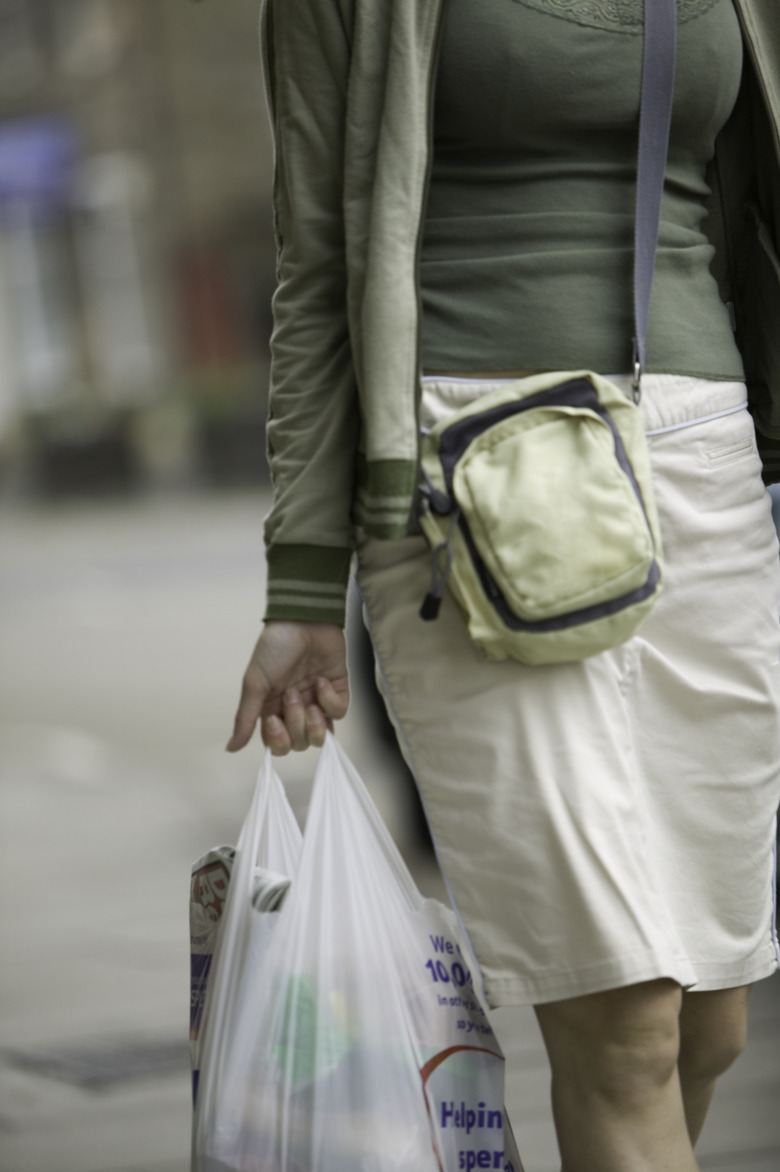Why Are Plastic Grocery Bags Bad For The Environment?
One hundred billion: that's the number of plastic grocery bags used in the United States each year. This means that the average American family gets 1,500 bags from shopping trips. Concerned about the environmental impact, some cities, such as Austin, Seattle and San Francisco, have banned their use. Other areas, like Washington, D.C., impose a small consumer tax on each bag used. From the collection of raw materials to the requirements for the disposal process, these bags affect the environment.
Land Mess
Land Mess
In a 2009 study released by Keep America Beautiful, 8 percent of the litter observed in public sites was plastic bags, including grocery bags. An estimated 1 to 3 percent of American plastic shopping bags wind up cluttering the environment outside of landfills. Even if they make it into the garbage, 100 billion bags take up space. Whether they're stuck in a tree, floating in the breeze or sitting in a trash pile, these bags don't decompose. They may be torn into small bits, but those pieces stick around a long time too: up to 1,000 years. Because they're made from petroleum, toxic chemicals can seep into soil and water.
Water Hazard
Water Hazard
Plastic grocery bag pollution on land is troublesome, but in the water, it's dangerous to animals. Sea turtles, marine mammals and fish confuse the bags with prey, such as jellyfish, and eat the plastic imposters. The bags fill up the stomach or digestive tract. Animals may not eat because they feel full, or the blockage may prevent the digestion of real food. In either case, ingestion of bags can lead to malnutrition, and eventually, starvation. Bags can also become caught on waterfowl or coral and wrap around the animals, causing injury or death.
Trash Can or Recyle Bin
Trash Can or Recyle Bin
Recycling is good for the environment because it keeps materials out of landfills. Although plastic grocery bags can be recycled, the United States recycles only about 2 percent. Even if bags are placed in curbside recycling bins, they're so light that breezes can snatch them up and turn them into litter. If plastic bags do make it to recycling centers, they can cause problems. They're not substantial enough to be separated from other recyclables by automated machinery, so the work must be done by hand. If bags are not separated properly, they jam machines and slow down the recycling process. These efforts may not even be worth the trouble, because the recycled plastic from bags is not in demand.
Petroleum Problems
Petroleum Problems
Plastic grocery bags add to environmental problems because they're made from petroleum products, which are nonrenewable. Each year, twelve million barrels of oil are used to make bags for the United States alone. The process of drilling and accessing oil supplies upsets the local ecosystems. Emissions from the manufacture and transportation of bags contribute to global climate change.
References
- Keep America Beautiful: Littering Behavior in America
- Salon: Plastic Bags Are Killing Us
- Sierra Club: The Problem with Plastic Bags
- Greenpeace: Plastic Debris in the World's Oceans
- BDN Maine: Plastic Shopping Bags Are Recyclable, but Still a Headache for Waste Managers
- Californians Against Waste: The Problem of Plastic Bags
- NRDC: NRDC Lauds Passage of New York City Council Legislation Requiring Groceries, Retailers to Provide Plastic Bag Recycling for Consumers
- New York Times: Is It Time to Bag the Plastic?
- USA Today: U.S. Cities Increasingly Ban or Tax Plastic Shopping Bags
Cite This Article
MLA
Sherwood, Susan. "Why Are Plastic Grocery Bags Bad For The Environment?" sciencing.com, https://www.sciencing.com/plastic-grocery-bags-bad-environment-7746/. 24 April 2017.
APA
Sherwood, Susan. (2017, April 24). Why Are Plastic Grocery Bags Bad For The Environment?. sciencing.com. Retrieved from https://www.sciencing.com/plastic-grocery-bags-bad-environment-7746/
Chicago
Sherwood, Susan. Why Are Plastic Grocery Bags Bad For The Environment? last modified August 30, 2022. https://www.sciencing.com/plastic-grocery-bags-bad-environment-7746/
